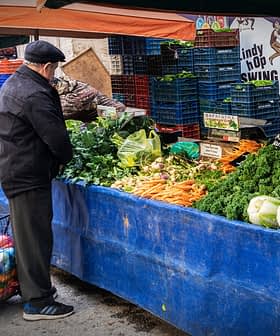On Sunday, Greek voters returned Prime Minister Alexis Tsipras and his Coalition of the Radical Left (SYRIZA) to power with a surprising 35.5 percent of the vote, well ahead of conservative centrist New Democracy’s (ND) 28.1 percent in what was expected to be a closer race. Winning almost as many seats in parliament as in its first victory in January, SYRIZA has again formed a coalition with the right-wing nationalist Independent Greeks party (ANEL) to compensate for its lack of an outright majority.
The government now faces the daunting tasks of implementing the unpopular austerity measures and reforms required for Greece’s latest loan deal, handling a continuing refugee crisis, recapitalizing banks, and lifting the remaining capital controls that have left businesses struggling with limited liquidity since the end of June.
Several European leaders expressed satisfaction with the return to Parliament of SYRIZA, ND, and other pro-European parties that support the agreement (or memorandum) with the European Commission, the European Central Bank, the European Stability Fund, and the International Monetary Fund for €86 billion in loans in exchange for additional budget cuts, tax increases, privatization, and extensive reforms.
This will definitely hit the olive oil industry hard.
The coalition government will control 155 of the 300 seats and two of the eight political parties in Parliament. Greece’s lenders hope that ND and several smaller political parties will join Tsipras in approving the laws required by the memorandum, such as one doubling taxes on farmers’ income by 2017.
If the opposition does this, the small size of new coalition government’s parliamentary majority may not be as important as the fact that the far left anti-bailout politicians who rebelled against Tsipras’s new, reluctant support for additional austerity measures not only exited SYRIZA to form their own party, Popular Unity, but remain absent from Parliament after a weak showing in Sunday’s election. Those former SYRIZA members’ defection in August prompted this snap election, since it left Tsipras without a parliamentary majority.
Having renewed his mandate, Prime Minister Tsipras emphasizes that he intends to fight corruption and vested interests while reviving the Greek economy, working for a fairer distribution of austerity measures, and seeking debt relief for Greece. European leaders suggest that a longer repayment schedule and a limit to debt servicing costs in relation to the GDP could be approved.
However, Bloomberg reports that Tsipras’s government will be severely constrained: “Virtually all key economic decisions have effectively been made by European finance ministers and central bankers, and any deviation risks a halt to aid payments.” Chloe Dimitriadis, who produces Biolea olive oil on Crete, told Olive Oil Times she thought the “memorandum dictatorship makes our politicians look like cartoon characters,” citing the record-low turnout for elections to emphasize many Greek citizens’ feelings of helplessness.
During a summer in which Greece came closer than ever to leaving the Eurozone, closed banks for three weeks, and instituted capital controls that further stressed a struggling economy, olive oil producers such as Dimitriadis and Cretanthos’s George Tzianoudakis said many of their customers were reluctant to order oil. Cretanthos maintained last year’s prices to encourage more orders, cutting into profits. Biolea also had trouble importing parts for machinery and maintenance. Others, such as Evo3’s Stratis Camatsos, were temporarily unable to export their oil.
On the other hand, Aris Kefalogiannis explained that Gaea felt a greater impact from “the low petrol prices and the resulting devaluation of the Russian ruble and the Norwegian krona” than from political uncertainty earlier this year. The company was able to more than compensate for lower European sales by increasing sales in the U. S. for a very successful summer.
Similarly, Argyris Bouras of Eleones Hellenic Olive Products reported that he had stocked up on olive oil rather than leaving money in the bank before capital controls, enabling a new expansion of his exports to Germany, an overall increase in sales, and stable prices for Eleones olive oil all year.
Like many others, Stamatis Alamaniotis, a business development consultant with family roots in the olive oil industry in central Greece, said he anticipates difficulties for olive growers if all the points in the memorandum are put into effect.
Stratis Camatsos told Olive Oil Times he expects “a hike in taxes” on farmers and an end to subsidies on diesel gas. “This will definitely hit the olive oil industry hard, as being price competitive is important in this industry, and if our costs go up, unfortunately, that will pass on to consumers, increasing our final price.”
Dimitriadis fears that part-time farmers working small family plots that have been subdivided over the generations — a large majority of Cretan olive oil producers, she believes — will have an especially hard time, given their lack of accounting skills and new bookkeeping and taxation requirements. She suggests that the plan seems to be to “reduce the occupation of farmer to the European average,” clearing the way for big companies to take over olive oil production in Greece.
Argyris Bouras agreed that things won’t be easy given the tax increase on farmers. But he hopes for “political stability for a couple of years that will help the olive oil industry and Greek companies in general make realistic medium-term plans,” which they have not been able to do recently.
As Kefalogiannis pointed out, the olive oil industry in Greece has been suffering from a lack of liquidity, like all Greek industries. He told Olive Oil Times, “unless the recapitalization of the Greek banks progresses swiftly, and the capital controls get further relaxed, we can’t expect an improvement in the economic climate.” Promptly swearing in his new cabinet, Prime Minister Tsipras has vowed to pull Greece out of the crisis, and the country is waiting to see how the situation will develop.
Greek olive oil producers expect a moderately good harvest this year overall. Kefalogiannis joins those who do not expect quite as good a harvest as last year, predicting it to be average. Stratis Camatsos is among those anticipating higher prices for Greek olive oil, largely due to the tax increases in the country.
Stamatis Alamaniotis fears that the olive harvest in much of central Greece will not be good this year. On the other hand, Argyris Bouras expects a similar harvest to last year’s in the Halkidiki area, and Camatsos anticipates the same for his family’s olive groves in Lesbos.
Emmanouil Karpadakis, marketing manager of Terra Creta, estimates that 20 to 25 percent less Cretan olive oil could be produced this year, compared to last. Chloe Dimitriadis expects Crete to produce a moderate quantity of very high-quality olive oil, given some unusual rain in August, and George Tzianoudakis is also counting more on quality than quantity in Crete this year.
Nikos Michelakis, a scientific advisor to the Association of Cretan Olive Municipalities (SEDIK), wrote on SEDIK’s web site that he expects Cretan olive oil production to reach approximately 98,000 tons this year.
While opinions are divided about what is to come, the more optimistic Greeks are hoping this year’s early rains herald brighter skies ahead and clearer days amid these times of uncertainty.








